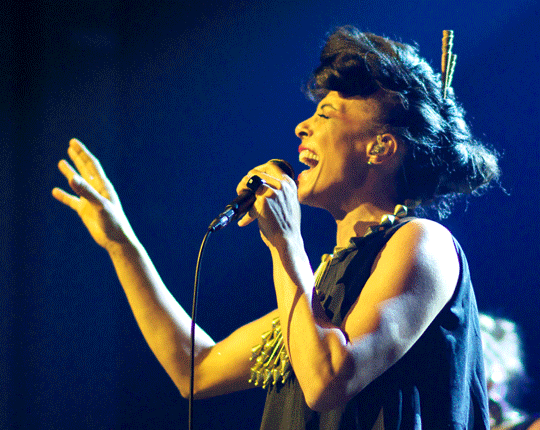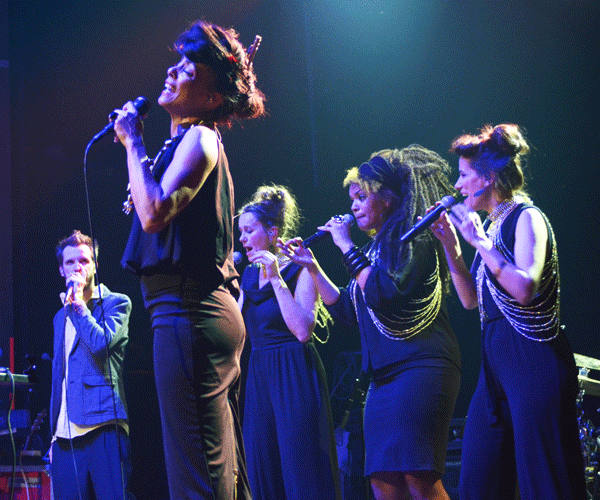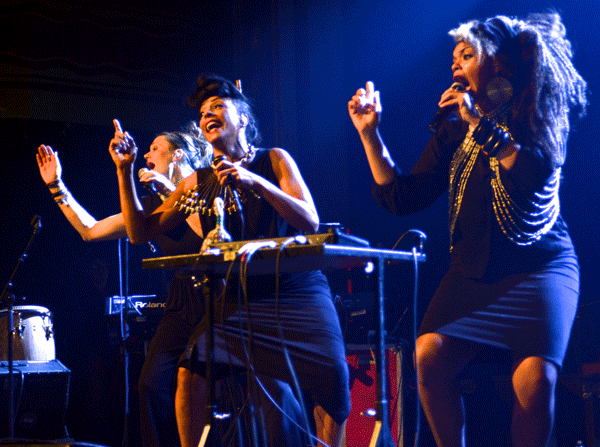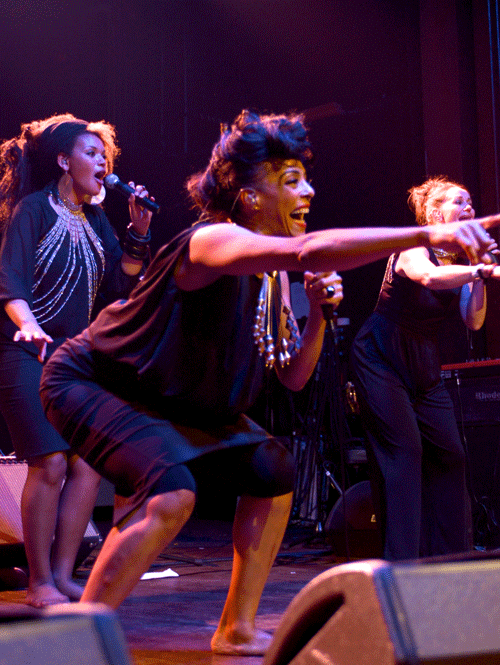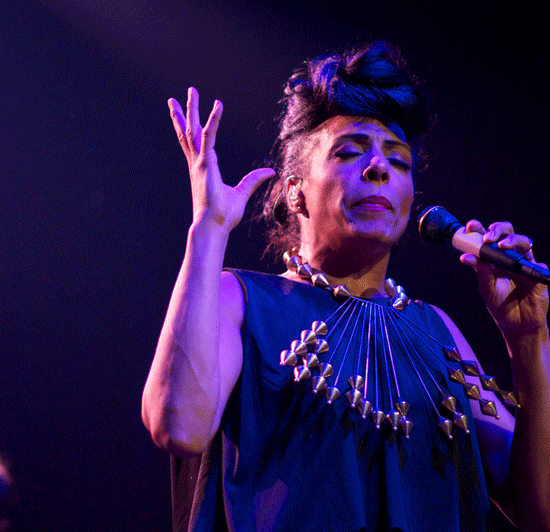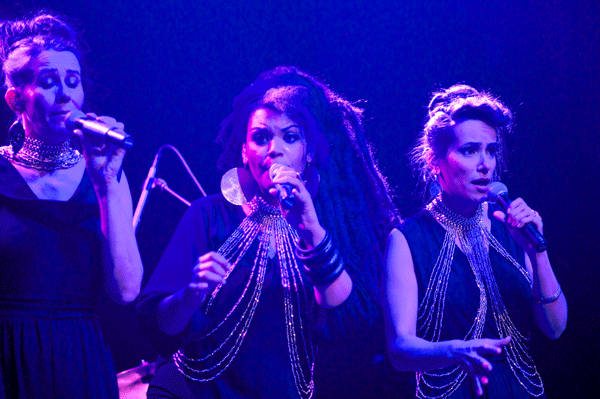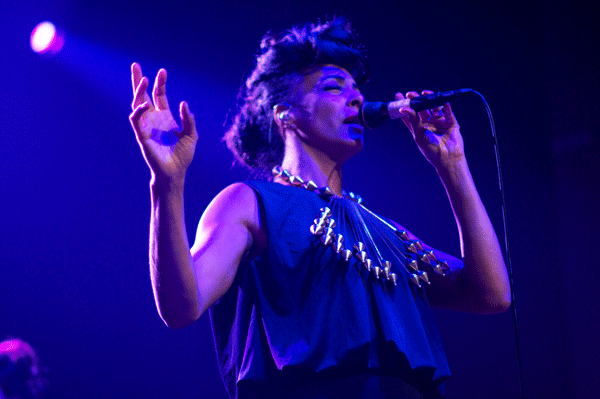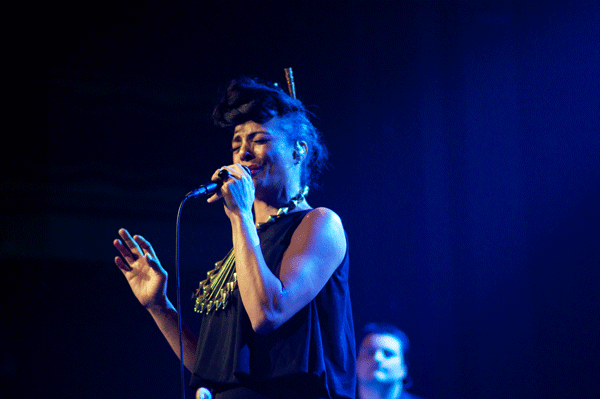Marie Daulne and the latest version of her genre-busting ensemble Zap Mama were a standout at New York’s recent globalFEST concert extravaganza. Marie is a traveler and an adventurer, and she’ll soon be back in the U.S. touring in a collaboration with Brooklyn-based Afrobeat band Antibalas. Afropop’s Banning Eyre met up with Marie after the globalFEST show to talk about her ongoing globe-trotting, new music from Zap Mama, and the collaboration with Antibalas. Here’s their conversation.
Banning Eyre: Marie, great to see you again. Bring us up to date on Zap Mama. It's been a few years since we spoke about the group.
Marie Daulne: The last release was in 2008, I think. That means six years ago. Wow! What happened was that I moved back to Belgium. I left the apartment in New York. Because for a few years, I was here, in Harlem, composing. I chose Harlem because there are a lot of Africans, a lot of West Africans there. And at the same time, all the funky hip-hop music. There is all this fusing—eating fish from the African restaurants, and afterwards going to the studio to record, or a movie. All this culture merging together. Harlem was the perfect place for me. And I composed a lot there.
I composed to the songs I have here. I had the chance to meet the guy from the Last Poets, Jalaluddin Masur Nuriddin. I sent him my lyrics, and he transformed them into poetry.
Marie Daulne and Zap Mama (Eyre 2015)
So is this material for a new album?
O.K., so it's all finished now. I have a double album. I want to say it's a double album, but maybe I will release the two one after another. I call the first one Eclectic, and the second one Flashback to Present. You had the story of Afropea, my beginning, afterwards we had Ancestry in Progress. And now I say Flashback to Present. There are some albums in between, but I make a connection between those three, because there is a relationship with African-American history. And what I bring on this new album is that I went back to Africa, to Benin, not long ago. I was seeing all the history from the past, what happened in West Africa with slavery and everything, and I had the chance to meet a lot of people from vodun, and hear the stories and listen to the music. And I was inspired by that. I composed some songs there, meeting some artists. And I said, “O.K., I'm going to make that bridge."
This is what I felt being in Harlem, feeling the dignity of Africa and America merging. And I said, “O.K., I'm going to compose on that.” This is the special point on the second album, Flashback to Present. This is really to make a link to Afropea, where I started. I wanted to remind myself of these sounds, the forgotten vocal sounds from Africa. On Ancestry in Progress, I'm merging with artists like the Roots, and [Erykah] Badu, and Common, my sons. And now it's a Flashback to Present. Because really, there is no way we can return. What I want to say is we are the ancestors of the future. All that we create now will be the inspiration of the future. I think were arriving at a moment where there is no way back.
OK, we talk about Egypt and all this. We have done this. Return to Africa—we have done this. We all return to Africa. It doesn't matter if you're black or white. We all return there because now we know that we all are coming from there, blah, blah, blah, blah.
And I said, “OK, what we are going to do now will serve the future? In every act we do, in every composition we do?” We have to find a way to be creative, because we all repeat and copy one another today. There's not a lot of creativity. Everybody knows what is African, world music. Before it was like, "What? World music?” This was all the media around me, because I represented a world music artist. Now world music artist means nothing. It's just what we as human beings have to propose. What can we do to make a better world? Because there are bad and good people in every culture. We all know that. So this album has that mentality.
That's Flashback to Present.
Yes.
Marie Daulne and Zap Mama (Eyre 2015)[/caption]
And what did you say the other one was called?
Eclectic. This is what you saw yesterday in the show. It's a return to a cappella. And I merge with this new generation, who bring something new. They said to me, "We've been inspired by Zap Mama.” They create polyphony, like I did with the pygmies, but they use electronic sounds. They do all these sounds like electronics, but it's organic. I said, "Wow!” That's why we have things like dubstep in this. I thought we needed to do this. So I compose my album with this new generation of beat boxers. The Zap Mama sound where it’s world and everything at the same time, telling stories. But it's eclectic, because there are plenty of sounds like yesterday, I have a song with Sly and Robbie. We actually did two songs.
So it's eclectic because there are a cappella sounds, like yesterday, but at the same time, we have Sly and Robbie. How I came to work with them is that we were programmed in the same festival, and they came to me and started singing to me one of my a cappella songs. And I said, "Wow, can we merge?" So I sent them an a cappella, and they did a groove. And the song is "Text." It seems this was the most popular song of yesterday. "Text." We all are texting. When you have two minutes, instead of taking time to use your imagination, you go to the phone. So this is a song about that. Let's take a minute and look at that.
It's a throwback to your old telephone song, from the first Zap Mama CD.
[Laughs] Yes, it's true. And so I'm asking, what do you have with your phone? Because it's so intimate, the phone. The phone hears all your stories. It's an extension of your ears and your arms. Today, especially today. And then the funny thing is there is no right hand and left hand anymore. Because everybody's typing with two fingers.
Marie Daulne (Eyre 2015)
I have to ask you about a song you did early in the set yesterday, the South African song.
Yes. It's a cover from Miriam Makeba. "African Sunset.”
You really nailed it last night. What a beautiful arrangement. I love that song.
Yes. Me too. I always bring it back. I cannot pass it, because people always fall in love with that song. And Flashback to Present has more songs like that. Not that one, because we recorded it on an earlier album. I forget, either A Ma Zone or Seven. But I perform it all the time, and I may have to do a new version, because this version is more kind of, I don't know, diva. Because in the beginning, it was more like me, the young lady. But now I've taken the key down. It's deep. This is what I did. Only piano and voices.
So you’re living back in Belgium now. You had been away from there for a long time. How do you find it?
It's cool, because I have more family, but it's funny in the same way, because everything happens for a reason. I went back there, and there was no tour, no album release, no nothing. Nothing going on. And then my mama passed away. It's crazy, because nothing else happened. I had planned nothing. And I was there for her. And she chose me. She had cancer, and then she went down, down, down. That was hard. Oh Lord, that was hard. And I said, "Why me? We are seven kids, and she chose me.” And then I said, “I can handle it. She knows what she's doing.” I am thankful that she gave me that power, because now I know I can make it
I spent a lot of time with her, running everywhere from one hospital to another, with doctors, and trying to find a solution. Can I be God? Can I save a life? What can I do? And cancer taking over and over and over. It was hard. But I became another person. I became who I was supposed to be. And she gave me her power. And afterwards, everyone's calling on me thinking I am the mama: "I have a problem with this. I have a problem with that.” And I thought, “She had all this on her.” Wow. Seven kids is a lot.
Marie Daulne (Eyre 2015)
If I remember correctly, your mother is the one from the Congo. Your whole link to pygmy singing came through her.
Yes. Her story is amazing. She's the one who gave me all this, and now she's gone. And I said, “OK, now I have to take it on another level.” And I feel that power in me. That's why I say I'm ready. I'm ready to do like Miriam Makeba did. We need an African mama all around the world. I am there to show modern Africa, contemporary Africa. I am bored and tired of seeing Africa begging and poor and always demanding. There is another Africa that we have to show to the world. Am I an artist? A visual artist? At the same time, I would like to do and involve myself more with Africa and talk about contemporary visual artists and filmmakers, and bring that all over the world.
When I saw Okay Player, for example, Okay Africa Player, I said, "This is what I want to do.” I'm going to meet with them again and say I have talent I want to share with you, and if I can be a producer, or a cultural ambassadress. This is what I want to do. I went to Africa, and Benin, as I explained earlier. And I did workshops with young artists there. But this is just the beginning.
I'm curious to get your impression about the young generation of African artists. We started our program in 1988. So our initial orientation was all about the artists of that generation. Now we have Okay Africa, who are more oriented towards the sounds of today. But there's a difference. This new music is not so colored by that fervor of independence, the excitement of ending colonialism. That older music was so much about connecting modernity with tradition, bringing tradition back. Nowadays, with the Internet era, most of these artists are focused on international trends. They seem less interested in linking with local traditions. Some are, but less.
Yes. This is why I think we need to show them. This is why I am turning back to Africa and saying, "O.K., you guys, wake up. You have so much over there." I think this is what will be my role now. It's why when I have all these artists who give me their CD and try to be the least African possible, I tell them, I understand. They're stuck in the country. They're not able to travel because of politics. Politics now says that Africans cannot travel all over the world. So they try to find a way.
To connect.
Yes. But there are some very good ones. For example, I liked Just A Band at globalFEST yesterday. When I listen to their music, they have something that is different. We talked, because they said they were inspired by Zap. I thanked them, because I'm proud of what they are bringing out. I don't know what part of inspiration they took, but…
I spoke with them too. They seem to know a lot about a lot of things. They told me that the Kenyan music scene had kind of died out for number of years. When they started, they said they didn't really have role models. There was no Hugh Masekela or Salif Keita on the Kenyan scene to look to as a model. So they went to the Internet. Then, when they started traveling, they went to places like the Rock and Roll Hall of Fame, and they saw how all these popular music forms have this great sense of history, heritage, lineage. And they felt like they were missing that. I thought that was an interesting observation.
Yes.
It's a challenge.
Yes, it's a challenge. Yesterday, I was a little disappointed with some of their tracks, because they were adding too much jazz for me. But at the same time, when you're a musician, you want to discover the openness of jazz, all these possibilities. Do they really have to stay and have the flag of being African? I've been trapped in this vision too. I started with a cappella, and all this African dress, and then when I started to move to the U.S. started to merge with American music, people complained, and said, "Why are you not exotic anymore?" And I said, "Why do I have to stay exotic for you? Why can I not be exotic for myself. Because for me, America was exotic."
Well, audiences are fickle.
Yeah, well, I got new fans. And I lost some. It doesn't matter. I do what my inner voice guides me to.
Zap Mama (Eyre 2015)
I remember the moment when you first toured with the band, and you had Dizzy on guitar.
Yeah.
That was beautiful. But audiences always try to trap artists where they remember them and first fell in love with them.
Right, because music marked a period of their life. This is what the power of music is. You remember a good moment of your life and you don't want to change that, because it’s the soundtrack of your memories.
What I saw last night is that you still have all of that. It didn't feel like anything had really been left behind.
Yes, great. But I couldn't really present exactly the way I wanted, because normally there is a stage with projection, and every song has a story, and projections.
Will you do that on the Antibalas tour?
No. Because Antibalas is another thing. It's a merging. I took some of the same compositions, but I'm merging them now with Antibalas.
Ah, so it's not just a double bill, you will be performing with Antibalas.
Yes.
Tell me about this. How did this come about?
Chris Goldsmith, who is the A&R behind my new records, was contacted. I don't ask, you know, how they contacted one another, but the question was, “Can we do a tour, Antibalas and Zap Mama?” And I said, "We need to merge, creating something. Doing one band with another, no. No. I think we need to be powerful." What we artists have is the imagination that kicks open the door, and opens something new. Let's merge and play together.
So the set will be have you all playing together? How will that work?
I came up with this idea. Let's create the story of breath. We’re looking for a purpose in life, and the breath becomes music. Breath. So we start the show with all polyrhythms with the breath. And then one instrument comes. And then we start singing, and then another arrives playing an instrument, and then we merged with Manou Gallo who is going to be there on bass.
Really? Manou Gallo. That’s interesting.
Yeah, she’s great. So she's merging, and then another, and then the horns come with our horns that we do with our voices. And then the horns merge, and then after we do one song, and then after they start performing. And we come back adding the female vocal to their very masculine set up—to open it more. So we do my songs, we do their songs, and after we do a cover of Fela.
Marie Daulne (Eyre 2015)
Wow, that sounds fantastic. I can't wait to see it.
Yeah, me too. I want to be a female Afrobeat singer. This is where I see my future. I know that I can go all over the world. We need this kind of femininity, especially after being in Benin, and seeing how they have queens and kings from the past, the Dahomey kingdom. Nobody ever mentions that. And I said, "OK, I'm going to be that kind of figure." Even with my looks, people can say, "Ah, I remember that moment." Did you see the Fela! show on Broadway?
Yes. A couple of times.
Me too. For me, it's kind of the same thing. But instead of having a man and the women being behind, I'm going to be in front.
Have you always been a fan of Afrobeat?
Yes. Yes. I grew up with it. My mom had a café. She opened the first café for Belgo-Congolese people. And she played all this music, Manu Dibango, makossa music, Afrobeat, Fela… We wouldn't fall asleep, because we had a house that was underneath the café, and you would hear the bass. We fell asleep every night with this bass. I realize now, that I grew up with that bass. And that's why I love Congolese music. Because it was nonstop on the jukebox.
That's interesting. I remember for my early travels in Africa that Congolese and Nigerian people were particularly famous for favoring their own music, and not being all that interested in other people's music. In both cases, these countries created genres that have really lasted. These are things that came about through experimentation—take a little of this and a little of that—but then they reach a point where it really is something. It's not a fusion anymore. It’s Afrobeat, or soukous, or mbalax. It’s always interesting when that happens.
Yes. I agree.
Did you see the band from Brazil, Bixiga 70, that was playing Afrobeat at globalFEST?
Yes. I saw the rehearsal. Very interesting. Oh, I forgot to mention, on my album, I have Seu Jorge. We do an Afrobeat song together. I came with the idea, but I'm not an Afrobeat musician. I couldn't really guide them. I gave what my vision of Afrobeat is, and then the Seu Jorge band started to play, and we did a duet.
Marie Daulne (Eyre 2015)
So when will we hear these new recordings?
Probably after this new tour with Antibalas. And I hope we will do a recording together. For these two albums I have, all the recordings are there, but it's not live. So I said, “This is perfect. Let's do it with them.” I haven’t proposed this yet. But it’s there. Why not
Why not, indeed. Thanks so much for this.
Zap Mama and Antibalas are currently on a lengthy American tour. Check out the dates below!
Jan 27- Variety Playhouse Atlanta, GA
Jan 28- Carpenter Theatre Richmond, VA
Jan 29- Ferguson Center for the Arts Concert Hall, Newport
Jan 30- Lisner Auditorium Washington, DC
Jan 31- Wilkins Theate Union, NJ
Feb 03- Eisenhower Auditorium State College, PA
Feb 04- Byham Theater Pittsburgh, PA
Feb 06- Music Hall Center Detroit, MI
Feb 07- Koerner Concert Hall Toronto, Canada
Feb 09- The Latchis Theatre Brattleboro, VT
Feb 10- Fuller Hall St Johnsbury, VT
Feb 11- Highline Ballroom New York, NY
Feb 12- Jorgensen Auditorium Storrs, CT
Feb 14- Park West Theatre Chicago, IL
Feb 15- Wisconsin Union Theater Madison, WI
Feb 17- Rio Theater Santa Cruz, CA
Feb 18- Laxson Auditorium Chico, CA
Feb 19- John Van Duzer Theatre Arcata, CA
Feb 20- The Fillmore San Francisco, CA
Feb 21- The Broad Stage Santa Monica, CA
Feb 22- Belly Up Tavern San Diego, CA
Feb 24- Scottsdale Center for the Performing Arts (Piper Theater) Scottsdale, AZ
Feb 25- Fox Tucson Theatre Tucson, AZ
Feb 27- Lee Ross Capshaw Auditorium El Paso, TX
You can purchase tickets for the shows here.








